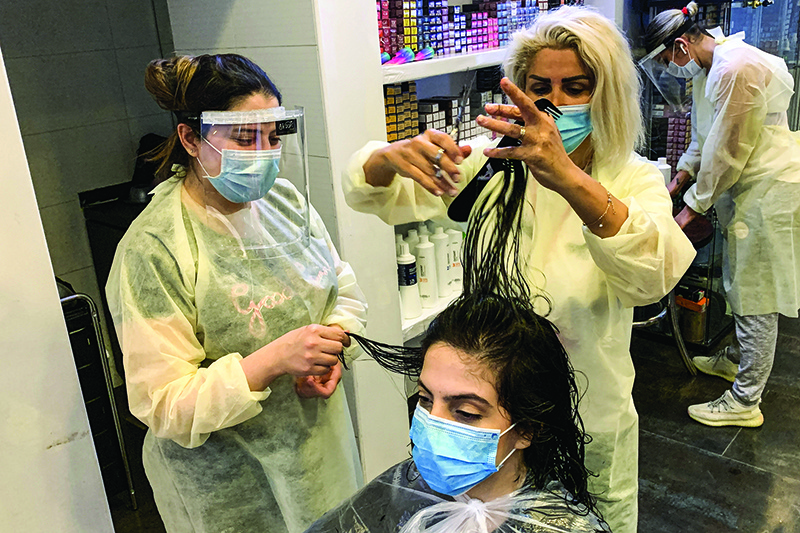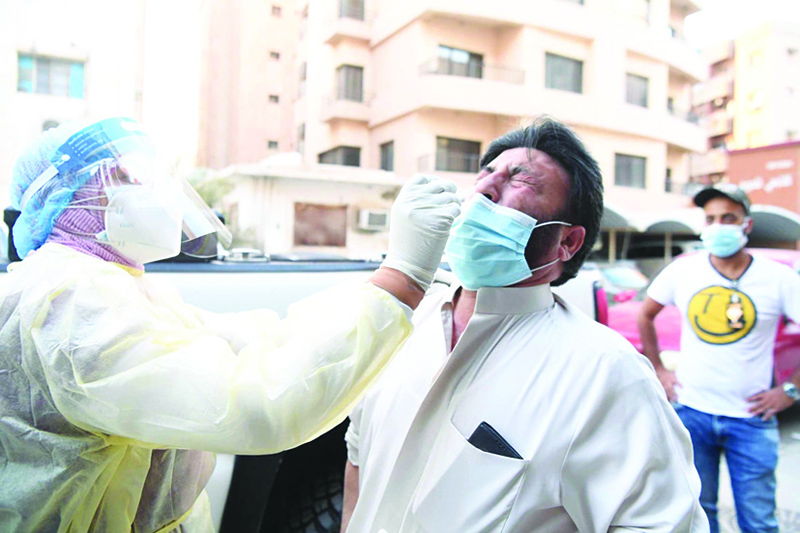

RIYADH: A hairdresser clad in a face shield and mask cuts a client’s hair at a women’s beauty center on Sunday. — AFP 

KUWAIT: Health ministry workers conduct random field testing for the novel coronavirus (COVID-19) in Hawally on Sunday. — Photo by Yasser Al-Zayyat
By B Izzak and Agencies
KUWAIT: MP Khaled Al-Otaibi yesterday sent a series of questions to Minister of Commerce and Industry Khaled Al-Roudhan over what he says is the minister’s failure to check soaring consumer prices during the coronavirus crisis. He said that despite repeated statements by the minister and other officials that they would prevent any price hikes through continued inspections, the crisis has revealed that the ministry agencies are weak, as prices of most commodities soared to the extent that budgets of most households have been impacted.
The lawmaker charged that the ministry failed to issue the necessary decisions and failed to act, leaving consumers to become victims of greedy merchants. Otaibi asked Roudhan if the ministry has conducted studies about the inflation rate during the coronavirus crisis and demanded copies of those studies.
He said that at the start of the crisis, the ministry of commerce raised the prices of meat and fixed them.
But merchants are still selling meat at higher prices without any action from the ministry. The lawmaker asked the minister why the ministry did not take any action to bring the prices of meat down to pre-crisis levels after the situation has relatively returned to normal, and also inquired why prices of imported fish rose sharply at cooperative societies and other supermarkets.
MP Hamdan Al-Azemi, who last week was suspected of being infected with the coronavirus, said yesterday that he has tested negative for the second time, showing that he had not been infected in the first place. Azemi also said he will still complete the remaining part of the 14-day home quarantine advised by the ministry of health for all MPs who attended last Tuesday’s Assembly session.
Assembly Speaker Marzouq Al-Ghanem said at the start of the session last Wednesday that he was informed by the health ministry that a member of parliament was suspected of being infected with the coronavirus. He advised all MPs who attended Tuesday’s session to undergo tests and start a 14-day home quarantine. Azemi had tested negative when he was examined the next day.
MP Adel Al-Damkhi said yesterday that Minister of Social Affairs Mariam Al-Aqeel told him that the ministry has not banned a virtual symposium to discuss corruption related to the Malaysian sovereign wealth fund to be organized by the Kuwait Society for the Defense of Public Funds. Initially the ministry objected at the symposium because organizers did not apply for a permit, but later gave the green light to the event. A number of Kuwaiti figures are implicated in the scandal of the fund and the public prosecution is investigating the case.
Meanwhile, Saudi Arabia on Sunday ended a nationwide coronavirus curfew and lifted restrictions on businesses, including hair salons and cinemas, after three months of stringent curbs, despite a spike in infections. Prayers were also allowed to resume in mosques in the holy city of Makkah, state media reported, just weeks before the annual hajj pilgrimage is due to start.
International flights and religious pilgrimages, however, remain suspended and social gatherings of more than 50 people are prohibited, according to the interior ministry. But Saudi Arabia’s General Commission for Audiovisual Media announced the reopening of cinemas across the kingdom with strict guidelines on social distancing.
"We are happy and cautious at the same time... I have been without a haircut for five months,” said Bashayer, a Saudi customer at a Riyadh hair salon. "But we are... scared. I sanitize my hands whenever I touch anything,” she said, while a hairdresser clad in a mask and face shield cut her hair.
The kingdom, which has the highest reported coronavirus infections in the Gulf, has seen a spike in cases after it began a phased easing of stringent lockdown measures in late May. On Sunday, the total number of infections rose to 157,612, while the death toll climbed to 1,267, according to data from the health ministry. Intensive care units in the capital Riyadh and the Red Sea city of Jeddah are crowded with coronavirus patients, putting pressure on the healthcare system, medical sources told AFP.
Neighboring Dubai announced on Sunday it would allow tourists back in the Gulf city state from July 7 after a closure of more than three months to contain the coronavirus. "Dubai to welcome tourists from July 7,” the emirate’s media center said, quoting the Supreme Committee of Crisis and Disaster Management. It also gave a list of protocols for travellers entering the Gulf emirate.
"Travellers must stringently comply with preventive measures and safety procedures put in place by Dubai and destination countries,” the report said. Tourists are "required to present recent COVID-19 negative certificate or undergo testing at Dubai airports” it said, with those testing positive to observe a 14-day isolation. A test for coronavirus is mandatory and should done 96 hours before travelling to Dubai, the report said.
Visitors are also required to have international health insurance and download a special phone application that lists their details, as well as fill a special "health declaration form”, it added. Dubai also announced that citizens and residents would be allowed to travel abroad from today. The UAE has recorded nearly 45,000 cases of coronavirus, including 302 deaths.

